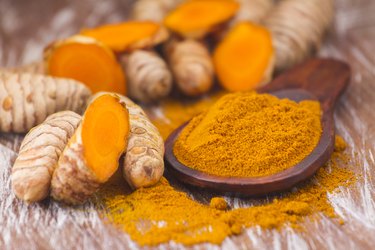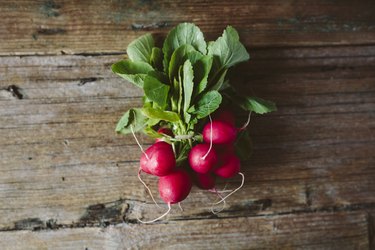
Instead of falling for another juice cleanse that promises to "detox" your system after a night of drinking or post-vacation, trust your body to get the job done. It has a remarkable built-in detox system also known as your liver.
The liver, a roughly three-pound organ that sits under your diaphragm, regulates chemical levels in the blood, according to Johns Hopkins Medicine. It creates a liquid called bile, which ships waste out of your body and breaks down fats during digestion. The byproducts in bile leave your body when you urinate or poop, cleansing your system naturally.
Video of the Day
Video of the Day
Don't go crazy abusing your liver, though — you need to do your job with proper nutrition to keep that detox organ of yours in tip-top shape. Luckily, some of the foods you may already be eating can help keep your liver functioning at its best.
1. Water

Water isn't technically a food, but it's probably the one piece of nourishment you're not getting enough of that could benefit your liver health. That's because water is essential for good blood circulation and for waste excretion, according to a June 2015 article published in Evidence-Based Complementary and Alternative Medicine.
You can actually cleanse your liver by drinking water since most physiological functions of the liver depend on proper hydration.
It's hard to know how much water you should be drinking in a day, but Harvard Health Publishing suggests a healthy adult should get anywhere between 4 to 6 cups a day at a minimum. Older adults may need more water depending on certain medications and because as we age we may not realize when we need to drink more water. If you're exercising or live in humid conditions, you'll also need more H2O. Pay attention to when you're thirsty and drink up.
2. Olive Oil
Fatty liver disease refers to a condition where people develop fat in their liver, and people most at risk are those with type 2 diabetes or people who have overweight or obesity. And since people with fatty liver disease don't always get symptoms, they can be completely unaware they have it.
To prevent fatty liver disease, you may want to add some olive oil to your diet. People who added extra-virgin olive oil to their Mediterranean plan were observed to have a lower prevalence of developing it, versus those who followed a low-fat diet or those who only added nuts to their diet, according to a July 2019 study published in the Journal of Nutrition.
While it may seem counterintuitive to add fat to protect against developing a fatty liver, researchers indicate that extra-virgin olive oil may aid in glucose control, which can help protect you from developing type 2 diabetes, a risk factor for the disease.
3. Turmeric

Turmeric is having its day in the sun thanks to it being a potent source of curcumin, a powerful antioxidant.
Curcumin helps to reduce oxidative stress by neutralizing the harmful components of oxidative stress, according to July 2018 research published in Nutrients. Why's this important? Our daily routines can really wreak havoc on the liver: Alcohol and medications — even over-the-counter meds — can cause stress on the liver. And it's not just any run of the mill stress; it's oxidative stress. Chronic oxidative stress could mean liver damage if it's not addressed.
Curcumin also has a hepatoprotective effect on the liver, which means it can prevent liver damage thanks to its anti-inflammatory properties. You can get curcumin every day by adding turmeric to your favorite rice dishes, soups and even your latte.
4. Grapefruit
Here's another reason to crack open a grapefruit for breakfast: Naringenin is a flavonoid found in grapefruit that's linked to anti-cancer, anti-inflammatory and antioxidant effects on the liver, according to an April 2018 review study published in the World Journal of Gastroenterology.
Naringenin works to decrease oxidative stress and inflammation, both of which can increase your risk for liver damage.
Grapefruit is usually a food that health professionals shy away from because of its potential to interact with certain medications. If you're taking any medications that has a grapefruit warning, such as certain statins, calcium channel blockers or immunosuppressants, then try another food for liver health, as this could cause an unhealthy buildup of that medication in your body.
Read more: Grapefruit 101: Nutrition Facts, Health Benefits, Warnings and Delicious Recipes to Try
5. Oats
Starting your day with a serving of oats may be one of the best things to do for your liver. Oats have much-needed fiber, with just a half cup of dry oats giving you 4 grams or about 16 percent of your daily value, per the USDA.
Getting more of the nutrient day-to-day may boost your liver health because fiber helps reduce inflammation in the liver, according to November 2016 research published in Advances in Nutrition.
Here's how it works: Fiber helps keep the gut healthy and this can create a snowball effect on different organs in the body, including the liver. The term "gut-liver axis" refers to the link between the health of the gut and the health of the liver.
6. Cruciferous Vegetables

Since the liver is responsible for detox action, it's important to keep that system humming by offering it a helping hand.
Cruciferous veggies such as radishes, broccoli and cauliflower contain high amounts of glucosinolates and isothiocyanates, two compounds that may prevent and treat liver cancer by increasing detoxification enzymes in the liver, according to a May 2016 review article in Nutrients.
Vegetables also contain polyphenols, which are powerful antioxidants that have been shown to prevent the development of NAFLD by reducing oxidative stress and inflammation, according to the 2019 book, Dietary Interventions in Liver Disease. The Nutrients study also points to a general correlation between eating cruciferous vegetables and low rates of cancer, so load up on these veggies daily.
7. Coffee
If you are among the 75 percent of Americans who start their day with a cup of joe, your liver will thank you.
Coffee may reduce the risk of chronic liver disease and slows the advancement of it, according to a May 2017 review published in the World Journal of Hepatology. It also has shown promise in improving outcomes with cirrhosis and nonalcoholic fatty liver disease (NAFLD).
Coffee's beneficial effects seem to be independent of caffeine since other caffeinated beverages didn't result in the same perks. So, how much do you need to drink to notice an effect? Most of the studies indicated more than 2 cups of coffee to see any benefit to the liver — just hold the sugar!
Read more: 14 Legit Ways Coffee Can Boost Your Health
Tips for Good Liver Health
"There are two top things you can do for your liver," Diane Norwood, RD of The Wandering RD, tells LIVESTRONG.com. These are:
- Decrease your sugar intake
- Drink less alcohol
Too much sugar and/or alcohol can lead to a fatty liver — and even if you add good-for-your-liver foods to your diet, they cannot undo all the ill effects of taking in too sugar and alcohol. In fact, excess added sugar in any form can increase the likelihood of developing NAFLD by causing fat accumulation in the liver, according to a May 2018 article published in the Journal of Hepatology.
The bottom line: If you are working toward a healthier liver, cleaning up your diet is the best place to start. Skip the cleanse and detox your body from within with these nourishing foods.
- Harvard Medical School: "How Much Water Should You Drink"
- JAMA: "Nonalcoholic Fatty Liver Disease: A Systematic Review"
- Journal of Nutrition: "A Mediterranean Diet Rich in Extra-Virgin Olive Oil Is Associated with a Reduced Prevalence of Nonalcoholic Fatty Liver Disease in Older Individuals at High Cardiovascular Risk"
- World Journal of Gastroenterology: "Beneficial Effects of Naringenin in Liver Diseases: Molecular Mechanisms"
- Advances in Nutrition: "Impact of Dietary Fibers on Nutrient Management and Detoxification Organs: Gut, Liver, and Kidneys
- Nutrients: "Curcumin in Liver Diseases: A Systematic Review of the Cellular Mechanisms of Oxidative Stress and Clinical Perspective"
- World Journal of Hepatology: "Coffee: The Magical Bean for Liver Diseases"
- Nutrients: "Dietary Natural Products for Prevention and Treatment of Liver Cancer"
- Lee, Y. & Lee, J.: Dietary Interventions in Liver Disease - Chapter 8 - Protective Actions of Polyphenols in the Development of Nonalcoholic Fatty Liver Disease
- Journal of Hepatology: "Fructose and Sugar: A Major Mediator of Nonalcoholic Fatty Liver Disease"
- Evidence-Based Complementary and Alternative Medicine: "Plants Consumption and Liver Health"
- Johns Hopkins Medicine: "Liver: Anatomy and Functions"
Was this article helpful?
150 Characters Max
0/150
Thank you for sharing!
Thank you for your feedback!